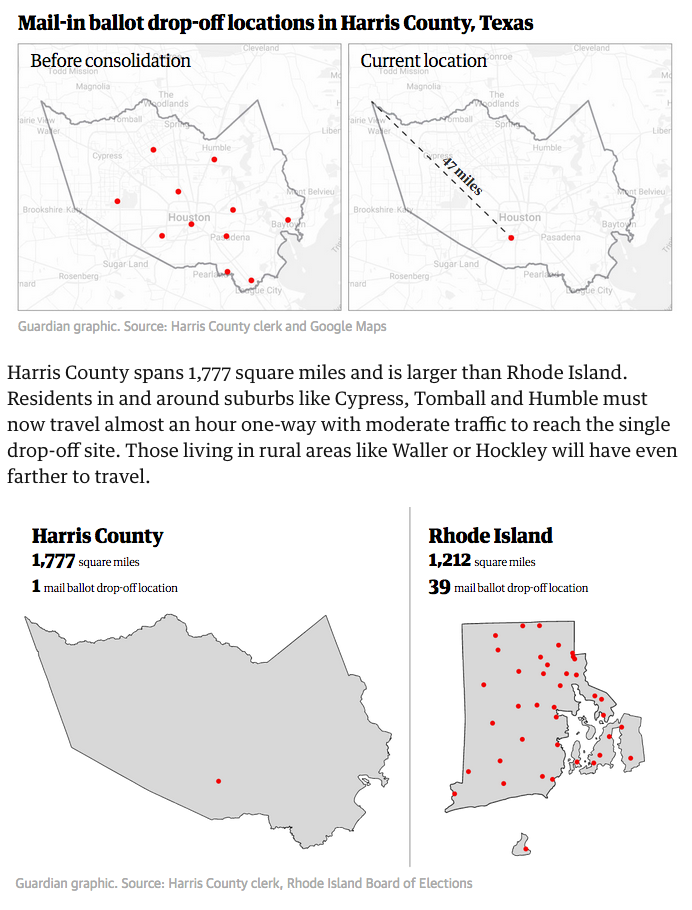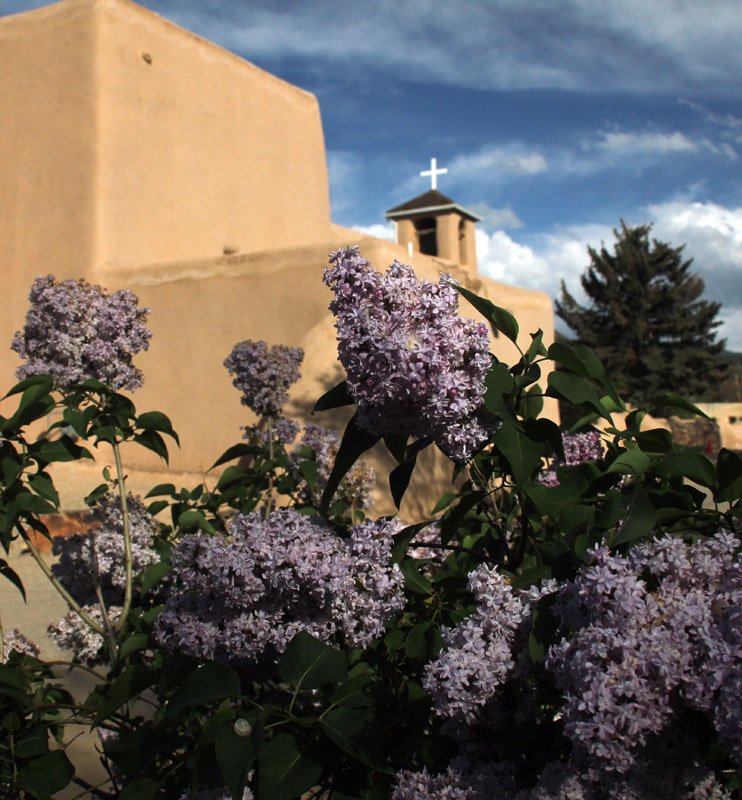Every American should be able to exercise their right to vote. I strenuously disagree with the notion promoted by some state legislatures that “voting is … a privilege to be enjoyed by “worthy” people and not by others.” I can think of few more shameful civic behaviors in America than attempting to disenfranchise voters.
This is not an equal-opportunity sin. The temptation to disenfranchise voters afflicts Republicans in power vastly more often than it does Democrats. This NPR story tries to explain why Republicans regularly erect barriers to voting, while Democrats seek to make voting easier. And to me, many of those barrier tricks feel like cheating voters.
I’ve already called out Texas as one of the most difficult states to vote in. Just because he can, the state’s governor has upped the ante. I mean, why would you do this:
if your intentions were — truthfully, now! — anything other than evil?
Two hours round-trip to vote absentee
I mean, do you know how big some Texas counties are, how many miles you might have to drive to reach the one county ballot box? I’ve driven across Texas three or four times, and I can tell you: it can be a mind-numbingly long distance between towns in the western part of the state.
For example, look at this pair of maps (also from The Guardian‘s article), showing the county containing Houston, one of the state’s biggest cities:

A lawyer involved in the suit to stop Governor Abbott said people had planned “how they would vote based on the rules that were already set, before the election started. To change these rules midstream and get rid of drop-boxes is to make it more difficult for people to be able to exercise their right to vote. That is plainly wrong…”
Here in Washington, on the other hand, ballot drop boxes are plentiful. They’re located near civic centers and post offices but also supermarkets, libraries and bus stops. Heck, we have 29 in my county alone. And even though I’m not a great walker, I can reach one in less than 15 minutes.
A question for Republican voters
But here’s what puzzles me most. Why would you vote for someone who, once sworn in and in power, would cheerfully make it harder for you and your neighbors to vote? Republicans may not be most numerous in the counties mentioned in the article, but they exist, surely? They want to vote easily and safely, don’t they? I can only guess that to Republican leadership, their votes are expendable in the greater effort to disenfranchise Democratic-leaning voters. In the recent past, voter fraud was a favorite excuse for limiting access to absentee voting. Now it seems no excuse is needed except “because I can.”
Early voting options in mid-October
The table below shows early voting options in the first few weeks of October. Another great resource about early voting is found on the Absentee Ballot Rules page of Vote.org.
| Oct. 5 | California, Iowa, Montana and Nebraska |
| Oct. 6 | Indiana and Ohio |
| Oct. 7 | Arizona |
| Oct. 12 | Georgia |
| Oct. 13 | Texas |
| Oct. 14 | Kansas and Tennessee |
| Oct. 15 | North Carolina |
| Oct. 16 | Washington |
| Oct. 17 | Massachusetts, Nevada and New Mexico |
| Oct. 19 | Alaska, Arkansas, Idaho and North Dakota |
These links come from a calendar of early voting access, state by state, published by The New York Times. For which a huge thank you! There’s also information about mail-ballots in NPR’s article Mail-in Voting Rules by State.
Read the fine print at the links for your state. Watch out for tricks and stumbling blocks in the process. For example, your state may impose strict requirements for early voting privileges. Then, it may give you a very short window before that early voting day. Similarly, if you request an absentee ballot, you may have to return it in a very short window of time. Decide not to vote early or absentee after requesting permission to do so, and you could face hassles at your polling station on actual Election Day.
I’ve voted: what next?
What else can you do? In addition to voting yourself, see if you can help someone else vote — maybe by driving them to the polling station (wear your masks!). Offer to help register under-represented citizens. Volunteer to be a poll worker if you’re young and healthy enough to do so. Work with those working to eliminate gerrymandering. Join a campaign in your state for permanent mail-ballot voting, as we do here in Washington, or perhaps making Election Day a national holiday.

This week’s Vote Now photographs…
Top: Wisdom, Montana (photo by T. J. Sagosz)
Bottom: San Francisco de Asis, Taos, New Mexico (photo by L. J. Cameron)

